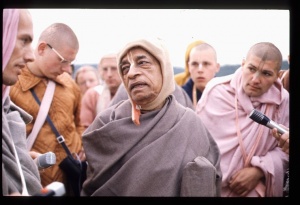CC Madhya 24.132: Difference between revisions
m (1 revision(s)) |
(No difference)
|
Revision as of 16:02, 20 March 2008

A.C. Bhaktivedanta Swami Prabhupada
TEXT 132
brahma-bhūtaḥ prasannātmā
na śocati na kāṅkṣati
samaḥ sarveṣu bhūteṣu
mad-bhaktiṁ labhate parām
SYNONYMS
brahma-bhūtaḥ—being one with the Absolute; prasanna-ātmā—fully joyful; na—never; śocati—laments; na—never; kāṅkṣati—desires; samaḥ—equally disposed; sarveṣu—all; bhūteṣu—to living entities; mat-bhaktim—My devotional service; labhate—gains; parām—transcendental.
TRANSLATION
“‘One who is thus transcendentally situated at once realizes the Supreme Brahman and becomes fully joyful. He never laments or desires to have anything; he is equally disposed to every living entity. In that state he attains pure devotional service unto Me.’
PURPORT
This is a quotation from the Bhagavad-gītā (BG 18.54).